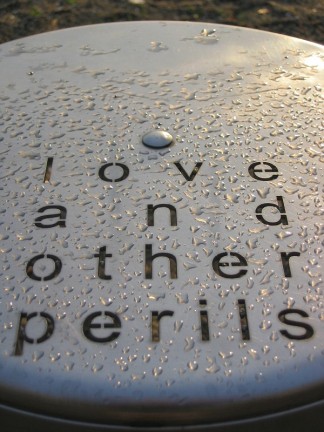Last night I fell asleep to the sound of my neighbors arguing. I don’t really know them, though they’re friendly on the rare occasion Roscoe and I meet them in the hallway. They are never noisy. Until last night, they were a practically invisible presence in my life. But when I heard her crying, the kind of crying you only do when you think no one is listening, when you find yourself in that strange, desperate place between love and frustration, I felt…sad and a bit sick.
I’ve spent the summer blissfully removed from that feeling. Even as I have tried to remember, to write about the moment J and I finally decided to move apart, I’ve failed. The dialogue sounds tinny, the tone melodramatic. All I could come up with was a single, strange image: the moment the ball breaks through the glass instead of bouncing off of it. Something broken, something changed that can’t be repaired. Maybe I can’t tell the story, I thought, because it just wasn’t as momentous as it felt. Because the argument was barely an argument, just a disagreement about how we’d spend our Saturday. And maybe I shouldn’t explain it, I told myself, because in the end isn’t it always the mundane that drives us apart?
Though I couldn’t even hear their words, the tones of my neighbors’ voices validated the feelings which just last week had seemed so distant and overwrought to me. I lay in bed reading and trying not to listen, and thinking how grateful I was not to feel like that.
I spent yesterday afternoon reading about the brain. The research on the literal, physiological chemistry of love is too complex for a single blog post. Several chemicals and neural systems are involved and new research is always amending what we think we know about the mysteries of the heart, which in fact all reside in the brain. But understanding a little bit about it helps us to understand a lot about how love stories function in our lives.
First there are mirror neurons, the cellular basis of empathy–at least that’s the most popular theory at present. They appear to be far more complex than most brain cells, which respond to a single frequency, sound, or image. The same mirror neurons fire when we pick up a mug to drink from it, when we see another person drink from a mug, when we think about drinking, and when we say the word “drink.” Some scientists believe mirror neurons explain why we love fiction, and, by extension, movies, songs, stories of all kinds. So it’s likely then that when we hear a midnight argument and feel a kind of unbearable empathy, that’s our mirror neurons at work. They’re why when, in Dirty Dancing, Patrick Swayze says, “No one puts Baby in a corner,” we grin goofily, as if he’s speaking those words to us. They might explain why we love love stories: our brains feel temporarily like we’re the ones in love.
Which brings me to dopamine. Continue reading


